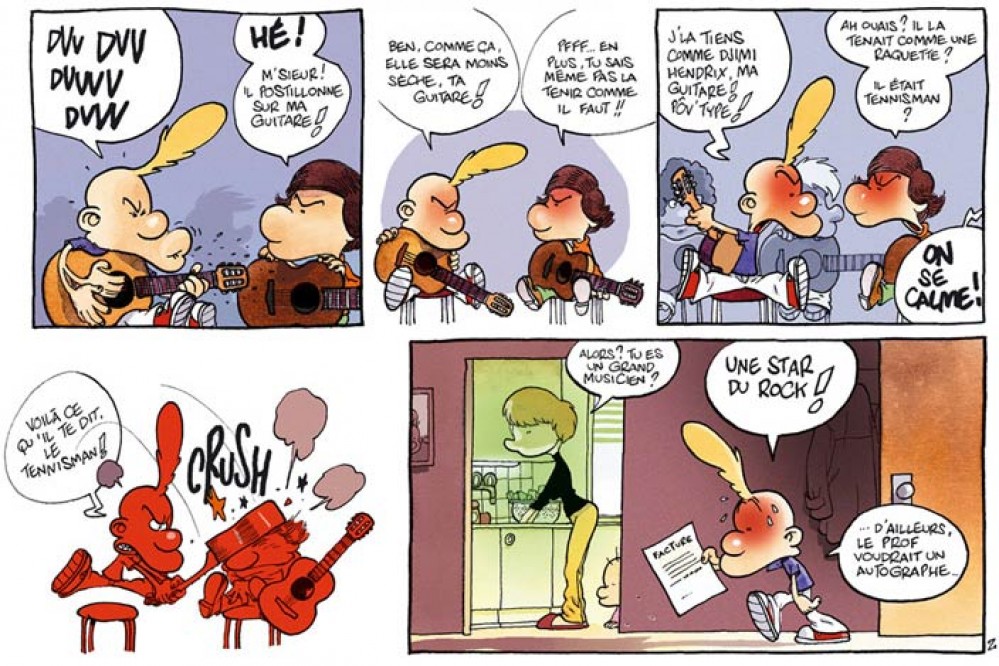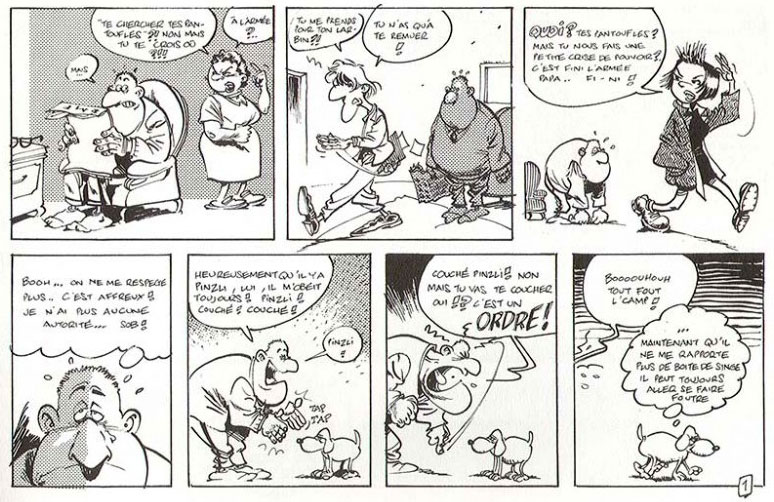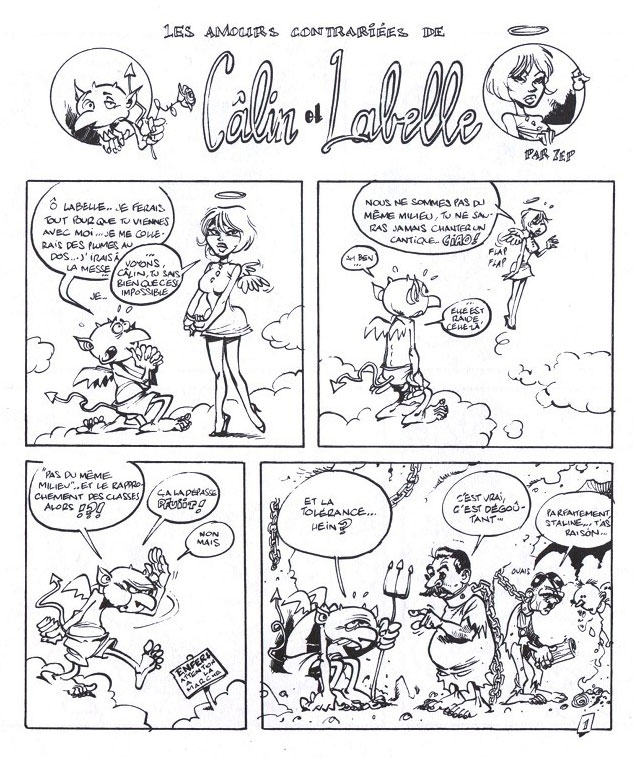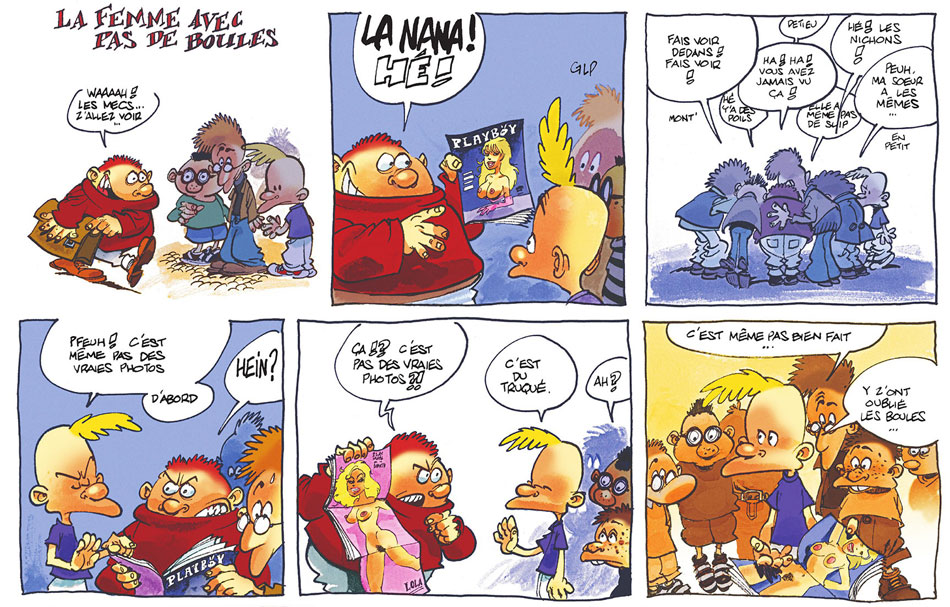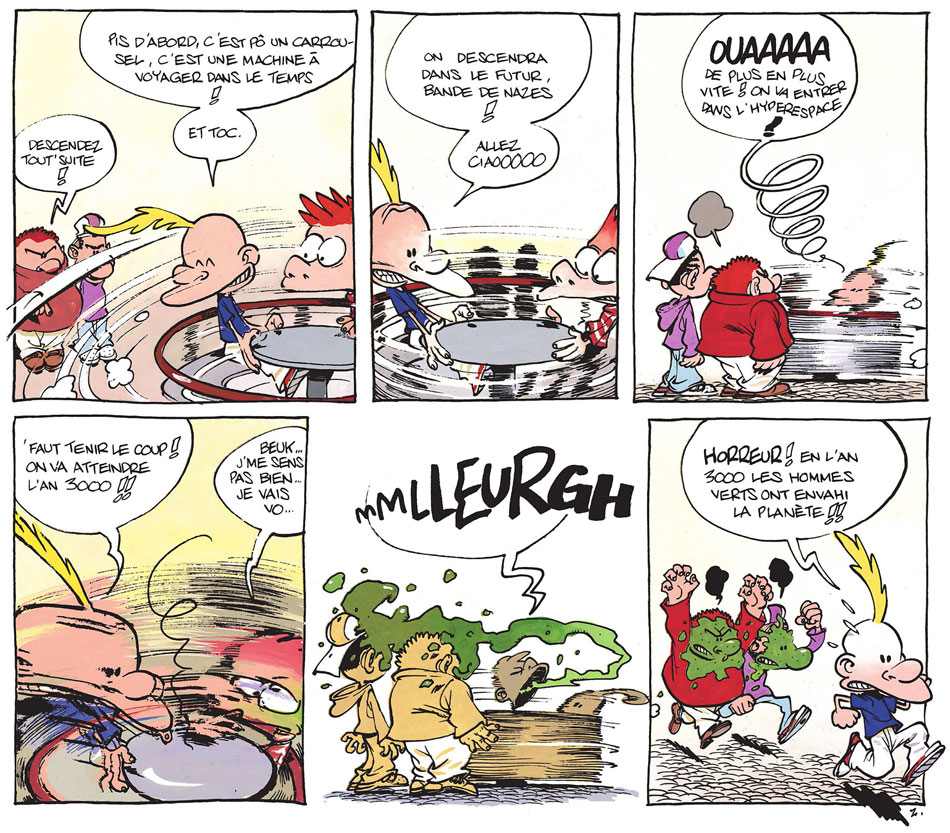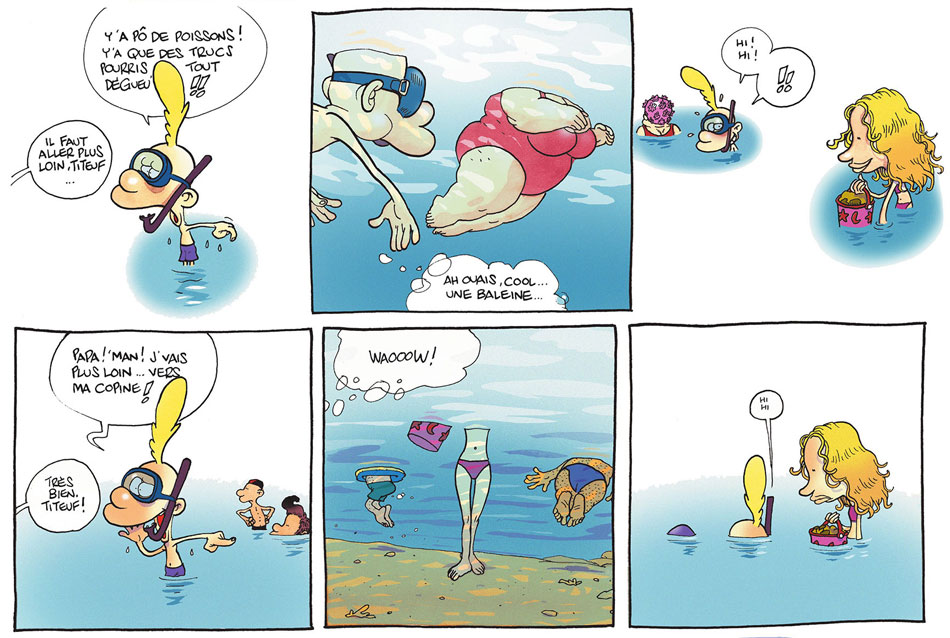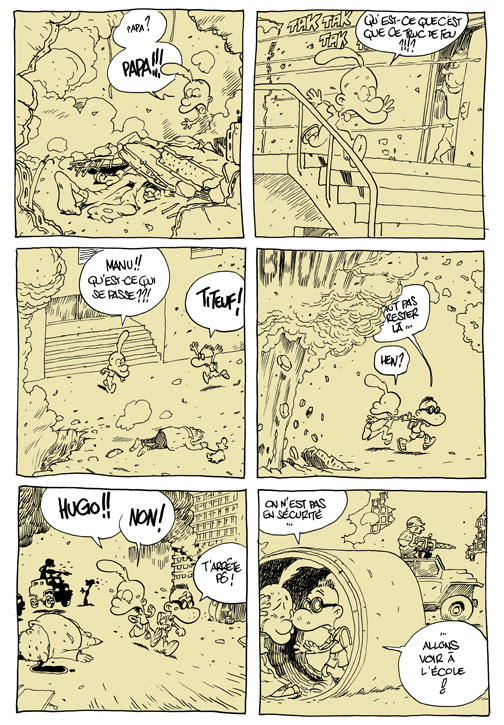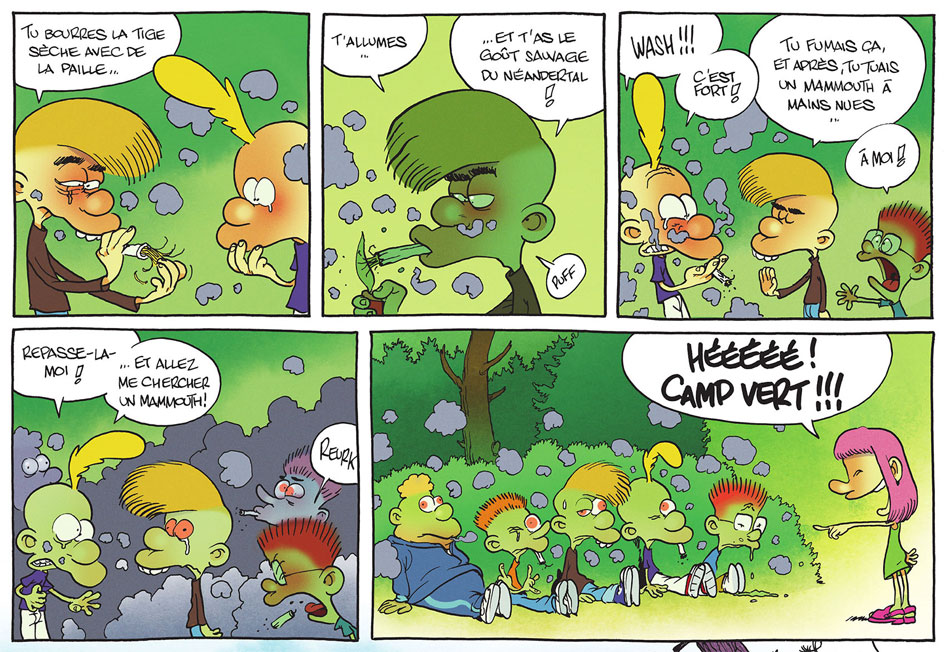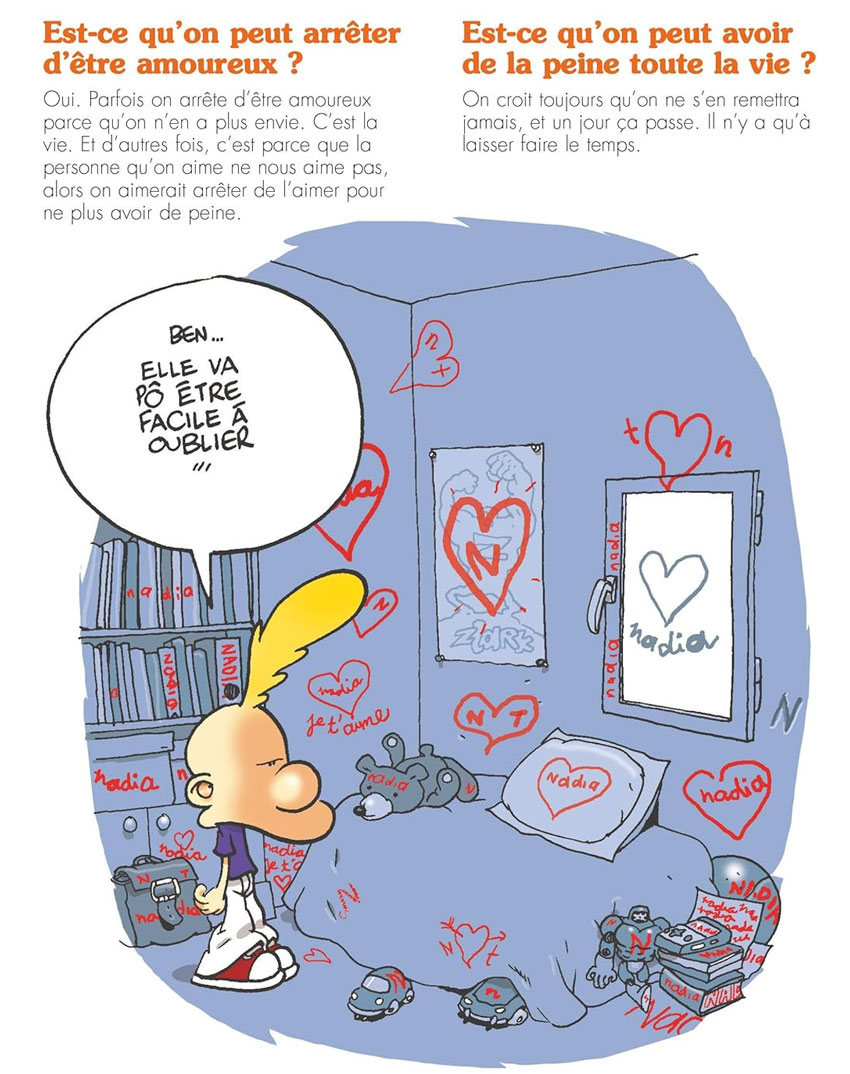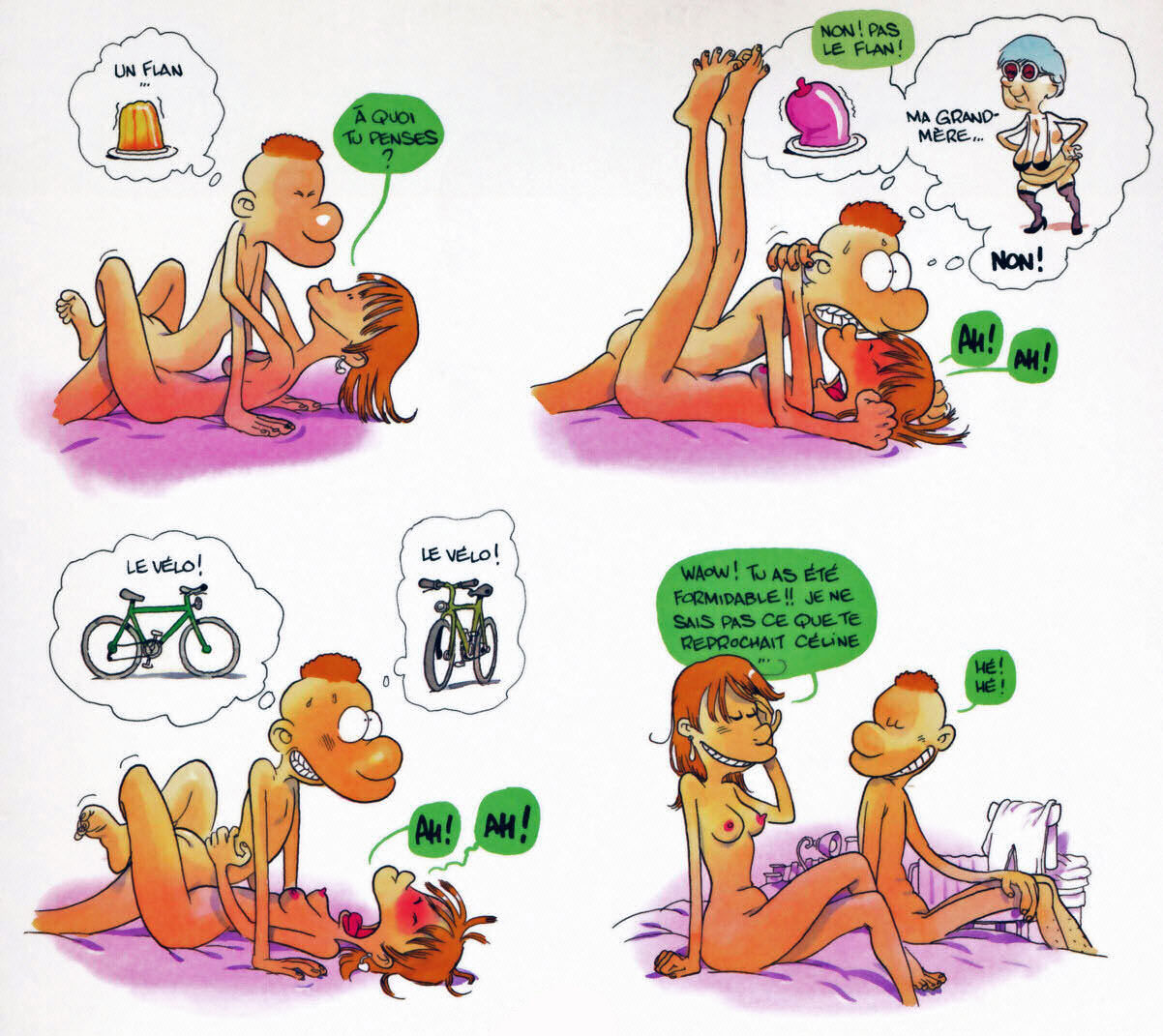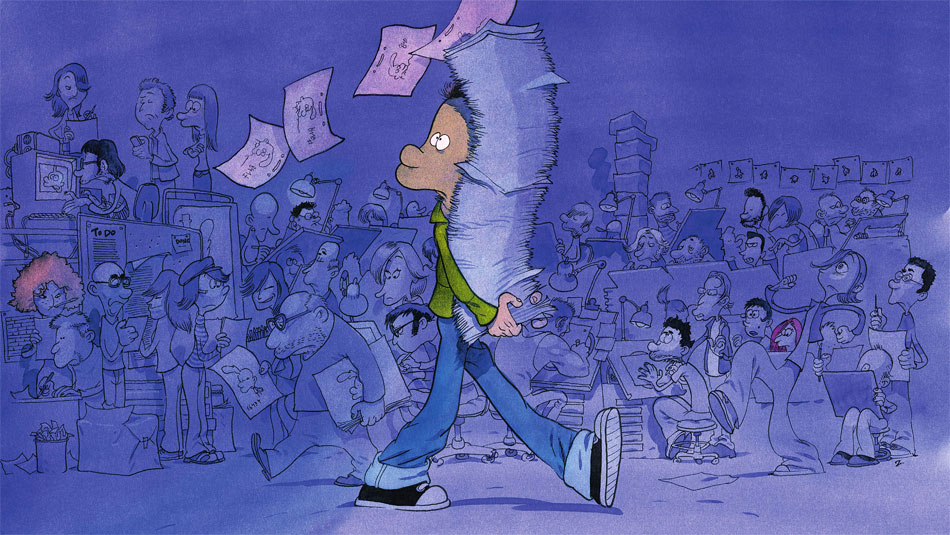Zep, pen name of Philippe Chappuis, is the creator of 'Titeuf' (1992- ), one of the bestselling French-language comic series of all time. His gag series about a yellow-quiffed boy has been translated into many languages and inspired both an animated TV series and a feature film, turning it into a true media franchise. While popular with children, 'Titeuf' is also notable for dealing with more mature subjects. Some played for laughs, like sexuality, others are more serious, socially conscious and thought-provoking, like immigration, ecological issues and diseases like cancer. In addition, Zep was co-creator of the comics monthly Tchô! (1998-2010) and wrote and drew erotic humor comics like 'Les Filles Électriques' (1997) and 'Happy Sex' (2009). As a music fan, he also drew gags about rock 'n' roll fandom, such as 'L'Enfer des Concerts' (1999), reprinted in 2010 as 'Happy Rock' (2010).
Early life and education
Philippe Chappuis was born in 1967 in Onex, Geneva, as the son of a policeman and a fashion designer. As a boy, Chappuis already enjoyed drawing and used to entertain other children making pictures. At age 12, Chappuis created his own comic magazine, titled Zep. The name was a homage to his favorite band, Led Zeppelin, and he later also picked it as his pseudonym. At age 16, Zep published his earliest drawings in the local paper Le Courrier De Genève. At age 17, he made a poster for a refugee center.
During his studies in Decorative Arts at the School of Fine Arts in Geneva (nowadays CFP Arts), the school opened a comic strip department, inspired by the Institut Saint-Luc in Brussels. Some well-known Swiss comic artists taught classes in this discipline, allowing Zep to meet people like Ab'Aigre and Daniel Ceppi. Among his graphic influences are Leo Baxendale, Carl Barks, Robert Crumb, Morris, André Franquin, Marcel Gotlib, Nikita Mandryka, Katsuhiro Otomo, Serge Clerc, Jacques Tardi, Cosey, Will Eisner, Matt Groening, Yslaire, Jean Cézard, E.C. Segar, Moebius, Frédéric Jannin, René Pétillon, Dupuy & Berberian, Yann & Conrad, René Hausman, Didier Tronchet, Lewis Trondheim and Jean-Jacques Sempé.
Between 1999 and 2001, Zep was married to fellow comic artist Hélène Bruller and he was subsequently married to writer and journalist Mélanie Chappuis. In later years, he has been in a relationship with musician Valérie Martinez.
'Victor'. Dutch-language version.
Victor
Another early recurring feature by Zep was the gag comic 'Victor' (1985-1991), about an apprentice in his grandfather's printing shop and a master of coming up with tricks to avoid work. Many gags also revolve around the misunderstanding between girls and boys, a theme Zep further explored in his later 'Titeuf' series. In 1985, when the cartoonist was still 17 years old, he managed to get his 'Victor' strip published in the Swiss women's weekly La Femme d'Aujourd'hui, where it filled the spot of the recently cancelled knitting page. In addition, Zep submitted his comic to the Belgian magazine Spirou., where it would reach a wider audience. Before accepting 'Victor', Spirou's editor Philippe Vandooren first had Zep draw a feature called 'Au Bout du Monde' ("At the End of the World", 1987), funny and poetic short stories featuring an explorer. Between 1988 and 1991, Spirou eventually ran the 'Victor' comic. This full-color strip already showed traces of Zep's easily recognizable trademark comic style. In 1988, Kesselring released a comic book collection with 'Victor' gags.
Kradok
For the magazine Jeudi Sports & Loisirs, Zep created the character of 'Kradok', in collaboration with writer Claude Delabays, AKA Leglode. Kradok is a young punk who is brainwashed by a pedagogue until he becomes a goody-two-shoes "nice boy". In 1991, Zep and Leglode released a one-shot comic book with an adventure of Kradok, 'Amanite Bunker' (Atoz, 1991). In hindsight, Zep felt 'Kradok' was more of a stylistic exercise than a good story. He drew several better stories for local fanzines and magazines, for instance L'Hebdo, Le Nouveau Quotidien and Sauve Qui Peut, and designed posters and illustrations.
Léon Coquillard
Zep's social consciousness was reflected in the 1990 landscape-format book 'Léon Coquillard', created by commission of the G.S.S.A., an anti-militarist organisation that opposes any Swiss involvement in war and the country's military draft. In Switzerland, all people have to fulfill military service in order to defend the country in case of "potential" foreign invasion, despite having been successfully neutral since 1815. In the comic, Zep and scriptwriter Christophe Gilli told the story about an officer who refused to take off his military uniform and was shadowed by a family psychologist who tried to reintegrate him into civilian society. The book was a bestseller and, according to Zep, sold for many years "under the counter" in military barracks.
'Les Amours Contrariées de Calin & Labelle', with cameos by Joseph Stalin and Adolf Hitler in the final panel.
Les Amours Contrariées de Calin & Labelle
In addition, Zep's artwork was published in magazines like Fluide Glacial and Champagne!. Between 1990 and 1992, Zep drew the satirical comic series 'Les Amours Contrariées de Calin & Labelle', which ran in the Catholic monthly La Vie. The gags revolve around the impossible love between the male demon Calin, and the female angel Labelle. In this comic, Zep also addressed political themes, like refugees, money laundering in Swiss banks and cameos from real-life people in the afterlife. Many readers of La Vie complained about these subversive, socially conscious themes, while others defended the comic. In 1995, the B.D. Club Genève collected all episodes in a comic book.
Scene from the first 'Titeuf' volume, 'Dieu, Le Sexe et les Bretelles'.
Titeuf
Although Zep's 'Victor' did well in Spirou, he waited in vain for an album release by the magazine's publisher Dupuis. The cartoonist started suggesting other projects, which were all rejected. Once he made a few realistically-drawn comics, the editors felt this was more his thing and encouraged him to continue on this path. But Zep soon got bored with this too. To let off steam, he drew comics based on childhood memories, scribbled in small notebooks. In 1992, they were published in the fanzine Sauve Qui Peut, after which an editor of the publishing company Glénat released them in book format under the title 'Titeuf'. Zep wasn't very interested in the proceedings, since he was already in demand as a poster and flyer artist. But as often ironically happens, the creation that cost him the least effort and he felt was nothing special, became a runaway success.
Titeuf is a young boy with a huge blond cowlick quiff. When things don't go his way, he tends to curse with his signature exclamation "Tchô!" or say: "C'est pô juste!" ("It's not fair"). His name is a corruption of the words "P'tit Oeuf" ("little egg"), because of the shape of the character's head. Not the brightest bulb, Titeuf's naïvity and recklessness often get him into trouble with his teachers, parents or fellow pupils. Titeuf lives together with his parents, Roger and Anne-Mathilde, and his baby sister Zizie. Other recurring relatives are his ugly aunt Monica, grandpa Pépé, wheelchair-bound uncle Glaïeul and Titeuf's tomboyish cousin Julie, with whom he is best pals. In school, Titeuf hangs out with a variety of colorful fellow pupils. His best friends are Manu and François, who both wear glasses. The shy, but loyal Manu tends to say laughable things, with François being the smarter of the two. Other buddies are Jean-Claude (who lisps due to wearing braces) and Hugo, who surpasses Manu in stupidity. The boy often hangs out with Titeuf, despite sometimes acting like a bully. Hugo has an older brother, whose tendency to swear often gets him into trouble. Titeuf has a secret crush on a girl named Nadia and several gags revolve around his erratic attempts at impressing her. But Nadia has ambivalent feelings towards Titeuf, whom she sometimes considers a nerd, while at other times she seems more sympathetic towards him, even getting jealous if he doesn't give her attention. Nadia's best friend is the pigtailed Valérie, whom the others nickname "Dumbo" due to her big ears. Nevertheless, Valérie and Manu have a secret relationship. Nathalie is another girl, notable for her leadership qualities.
From Titeuf #3 - 'Ca Épate les Filles'.
The 'Titeuf' series has a large group of recurring cast members from different ethnic backgrounds. Ramatou is black, Maxime a Muslim, Élie and Benjamin are Jewish, Ramón Spanish, Milos Croatian, Dimi Polish and Samuel American. There's also a Bosnian friend whose name remains unmentioned. In addition, Basil is autistic and Pauline has cancer, forcing her to wear a hat over her bald head. Titeuf often defends these pupils when others taunt them. Other kids in Titeuf's school are more gimmick-driven. Hervé has a tendency to throw up, so he is nicknamed Vomito. The sick boy owns a pet hamster, Moulinus, who tends to bite everybody. Puduk suffers from flatulence, and Morvax sneezes a lot. The younger kids Krok Lunett and Ze t'Aime are considered annoying toddlers who just won't leave Titeuf and his pals alone. Ze t'Aime often bullies Titeuf, despite having a crush on him. Romuald is a boy genius, while the pink-haired Thérèse is stupid. Marco is a permanent hypocrite who enjoys bragging. Kevin Lover is the heartthrob of all the girls in school, much to the other boys' annoyance and jealousy. The series' nemesis is Big Diego, an older boy who enjoys bullying the kids, while three nameless teens laugh along.
Titeuf's teachers also provide a lot of comedy, since most take sadistic delight in oppressing their pupils. Josaine Biglon is a strict elderly educator, of whom Titeuf suspects that she's actually an extraterrestrial. Mr. Musclor is the gym teacher who enjoys exhausting the kids with tormenting exercises. The school nurse lacks so much empathy for young patients that the children nickname her "The Big Cow". The groundskeeper Mr. Dubidet is another authoritarian whom the pupils love to rebel against. History teacher Mr. Dubouvreuil is so boring that Titeuf and his pals can catch up on sleep during his lessons. The only teacher Titeuf actually likes is the ski instructor, Benoît.
From Titeuf #8 - 'Lâchez-moi le Slip'.
Although 'Titeuf' is a children's comic, many storylines revolve around the child characters' naïve explorations of the world of adults. Girls and the mysteries of sexuality are a running gag. Right from the start, Zep wanted to depict childhood the way it really is. Interviewed by Vincent Coste for Midi Libre (20 November 2022), he recalled creating the series in his studio, while outside his window a group of children were playing on a school yard. He listened to them shouting and yelling obscenities at each other. This brought back memories of his own childhood and made him realize that most comics tend to sanitize and romanticize children's innocence too much. Interviewed by Stéphane Raïo (Le Figaro, 1 September 2017), Zep explained that many adults often forget their childhood: "It's an era of huge feelings, large pains and cruelties. A rich feeding ground for emotions, which we reduce to small things that we tend to run away from, as if they never existed at all." Accordingly, in early stories, the kids in 'Titeuf' are brats who use vulgarities and make dirty jokes about adult topics they only vaguely understand. Later albums unavoidably softened this original raw approach, because by that point the series had become very popular with children and had to remain on the same level of the family-friendly animated TV show it spawned.
In September 2015, Zep made a powerful statement on his blog with regard to the refugee issue.
Zep also addresses more socially conscious themes. Several children come from problematic backgrounds, like abusive parents, poverty, serious illnesses or have fled from war-torn countries. Zep also discusses environmental issues. In his opinion no subject is taboo, but only if he is able to translate it into a good gag or story. On 8 September 2015, Zep provoked his readers' conscience by drawing a special 'Titeuf' short story on his blog, addressing the war refugee crisis. Without explanation, Titeuf's house is suddenly bombed, killing off his parents. Trying to run for a safe place to hide, everybody he ever knew or loved is gunned down or crushed under collapsed buildings. When he and a few survivors make it to a refugee camp, they are not allowed in by the foreign authorities. Zep shocked many readers by killing off many of his familiar cast members in what has always been a "safe" humorous comic. Many fans praised him for bringing the easily dismissed faraway horrors closer to home, making readers realize that this could happen to anyone.
In the 14th 'Titeuf' album, 'Bienvenue en Adolescence!', Zep decided to let his characters age into adolescents, allowing for a whole new range of plot possibilities. The artist hinted that he perhaps would eventually let Titeuf grow into middle age and a senior.
Titeuf #17 - 'La Grande Aventure'.
Titeuf: success
After its first appearance in Sauve Qui Peut magazine, 'Titeuf' caught the attention of the publishing house Glénat, who released the first book in 1992. Originally, it only sold a few thousand copies, but within a couple of years, 'Titeuf' had become one of France's best-selling comics. By 2008, 'Titeuf' had sold 16 million copies in 25 languages, including English (as 'Tootuff' in the popular British children's magazine The Dandy), Dutch, German, Spanish, Portuguese, Italian, Turkish, Hebrew, Czech and Chinese.
One of Titeuf's catchphrases became the title of the monthly comic magazine Tchô!, which was launched in 1998 by Zep and Jean-Claude Camano. Glénat published it until 2010, after which Éditions Fleurus continued it until January 2013. Between 2018 and 2020, the magazine briefly returned under the title SuperTchô!, now as a quarterly magazine of 192 pages, again published by Glénat. Tchô! became breeding ground for a new generation of humorous French cartoonists, all working in the tradition of 'Titeuf', including Nob, Dab's, Olivier Supiot, Téhem, Christophe Bertschy, Boulet and Julien Neel. Zep himself co-created the superhero parody 'Captain Biceps' with Tebo, and 'Les Chronokids' with Stan & Vince, about two time traveling kids. Tchô! also spawned a collection of the same name at Glénat, which collected most of the magazine's features in book format.
In France, 'Titeuf' is so popular that a considerable number of parents have actually wanted to call their new-born sons Titeuf. In 2009, it led to a publicized case, because one civil servant felt it would be a violation of children's rights to name a child after such a naughty brat. A judge in Pontoise agreed with the complaint and in 2010 the Court of Versailles stated that "Titeuf" was not an acceptable name for children. The case was challenged in higher appeal.
Titeuf: merchandising and adaptations
'Titeuf' has also been adapted into an animated TV series, 'Titeuf' (2001-2007), produced by Smec Media in the first season and afterwards by France Animation. The show has been broadcast on Canal J, France 3 and RTS 2. Apart from countries with a large French-language population, like Belgium, Switzerland and Canada, the TV show was broadcast in Spain, Portugal, Italy, Poland, Russia and China. Compared with the comics, the tone was a bit more child friendly. In 2011, 'Titeuf' also inspired an animated feature film, 'Titeuf Le Film' (2011), which did well at the box office. The picture is notable for a guest role by rock musician Johnny Halliday, who voices himself. Titeuf' additionally spawned video and board games.
Titeuf: 'Le Guide du Zizi Sexuel'
The characters from 'Titeuf' also appeared in a sex education guide, 'Le Guide du Zizi Sexuel' (2001), co-created by Zep and his then-wife Hélène Bruller. The book came about because Zep noticed that a lot of youngsters have questions about sex and relations, which they sometimes don't dare to ask. While there were books available for this demographic, they were either too childish or serious to Zep's taste. Bruller met a nurse who gave sex education in elementary schools, providing them with a list of the most recurring questions. Based on this research, they made a book that talks about these topics in a playful manner, with Zep livening up the pages with witty cartoons. Interviewed by Karine Bauzin for the Swiss edition of Elle (2020), Zep explained that the illustrations give the topics a certain distance, which eases the communication with the reader. Titeuf gives young readers the reassurance that he understands things even less than them. Since he asks the "stupid" questions the reader also wondered about, readers are glad he embarrassed himself instead of them.
'Le Guide du Zizi Sexuel'. Translation: "She is going to be easy to forget."
Much to Zep and Bruller's surprise, 'Le Guide du Zizi Sexuel' became a best-seller, even bought by teens with their own pocket money. Zep was amazed that some youngsters told him that they actually kept it as a life guide on their nightstand. Even two decades later, when the original teens had grown up and had children of their own, they bought the book for their own offspring.
The book also spawned an exhibition (2001-2004), sponsored by the Cité des Sciences et de l'Industrie in Paris. Many moral guardians were outraged that "underage children" would be exposed to sexual imagery. The expos received petitions with over 8,000 signatures from the SOS Education organisation to cancel the event. In 2007, when the exhibition was revived, SOS Education protested again, this time collecting more than 40,000 signatures. In 2018, during the Brazilian presidential elections, ultraconservative political candidate Jair Bolsonaro (and future president) accused 'Zizi Sexuel' of "perverting the youth" and spreading "pro-LGBT messages". As could be expected, it only elevated the book's sales in Brazil.
In 2020, Zep released an updated version of his book, addressing more topics at readers' suggestion, such as Internet pornography. For this re-release, he received help from an all-female scientific team on behalf of the University of Geneva, led by Céline Brockmann.
'L'Enfer des Concerts', depicting The Rolling Stones' 1995 concert. Dutch-language version.
Side projects
Besides his successful comic series, Zep has done some side projects. During the 1990s, Éditions Dupuis published two gag books by Zep in their Humour Libre collection, dealing with the life of an adolescent. 'Les Filles Électriques' (1997) dealt with girls and sexuality, and 'L'Enfer des Concerts' (1999) focused on rock fandom. These two volumes were later included in Zep's "Happy" collection, a series of topical books with ironic and adult humor, such as 'Happy Sex' (2009), 'Happy Girls' (2010), 'Happy Rock' (2010) and 'Happy Parents' (2014). Interviewed by Romain Brethes for Le Point (23 January 2011), none other than Wolinski praised 'Happy Sex' for "continuing on the path we at Hara-Kiri took off 40 years ago." Zep was happy that these adult-oriented comic books became a success, because beforehand publishers had discouraged him from creating them, since he was "better as a children's comic artist." In 2015, Zep also wrote the erotic one-shot 'Esmera' for the artist Vince. On a more personal note, Zep has alternated his cartoony work with the watercolor drawings he makes for his travel diaries.
Graphic and written contributions
Together with 20 other comic artists (Ptiluc, Frank Margerin, Yslaire, Cosey, Philippe Vuillemin, Milo Manara, Loustal, Gilbert Shelton, Max Cabanes, Dupuy & Berberian, François Boucq, Gérald Poussin, Thomas Ott, Frank Pé, Frank Le Gall, Riff Reb's, Eric Buche, Enrico Marini and Valott), Zep illustrated a record single for the project '20 Vraies Fausses Pochettes De Disque Par 20 Vrais Dessinateurs de BD' (1995). Zep chose a song by Willy Deville. In 2006, Zep wrote the foreword to a reprint of Gotlib's 'Gai-Luron' comic. In 2012, he was interviewed for the documentary 'Sex in the Comics' (2012) and that same year, he designed the cover for the collective comic book 'Revoilà Popeye' (Onapratut, 2012), paying tribute to E.C. Segar's 'Popeye'. A year later, he drew a homage to Robert Crumb in 'A Tribute to Robert Crumb' (Éditions 52, 2013).
Zep also livened up single and album covers, particularly for Jean-Jacques Goldman, namely 'Chanson Pour Les Pieds' (2001), 'Ensemble' (2001), 'Les Choses' (2002), 'Tournent Les Violons' (2002), 'Je Voudrais Vous Revoir' (2002) and 'Si Je T'Avais Pas' (2003). He also designed covers for Jean F. Mathieu's 'Inguitarissable' (1996), Zazie, Vincent Baguian and Jean-Marie Leau's 'Sol En Cirque' (2003), Yannick Noah's 'Pokhara' (2003), 'Danse Avec Les Pingouins' (2006), 'Sous Entendus' (2007) by Waelkens, 'Bouge Encore' (2008) by Bill Deraime, 'Live Dans Un Bus' (2010) by Toufo, Henri Dès' 'Casse-Pieds' (2013), 'Monsieur Lulu' (2018) by Monsieur Lulu and Renaud's 'Les Mômes et Les Enfants D'Abord' (2019). An avid fan of music, Zep has also written and performed comical songs with his bands Zep'n'Greg, Blük Blük and The Woohoo. The latter group is a duo project with his wife Valérie Martinez.
After legendary comic artists Carl Barks and Gotlib passed away in 2000 and 2016, respectively, Zep drew a graphic homage to each of them. When in 2015 terrorists attacked the office of satirical magazine Charlie Hebdo and killed almost all of the cartoonists and writers inside, Zep was one of many cartoonists who responded to the tragedy. But he didn't directly address the murders or made a statement about freedom of speech or against religiously-motivated hatred. Instead, he drew the comic 'What A Wonderful World', about a dream in which he woke up as an animal, living in a world of beasts who have to be cautious of predators. At the end of this strange tale, he wakes up and is glad to live in a world surrounded by humans: "And since we're all the same species, I said to myself that this must be the easiest way to all live together." Interviewed by Yannick Vely for Paris Match (1 November 2015), Zep explained: "There were hundreds of drawings about crayons vs. kalashnikovs. I didn't want to make a drawing to oppose people against one another. It's like kids fighting on a playground, they spend their entire school years together, it's stupid. With this drawing I wanted to bring a certain pacifist message. I started my career as a freelance cartoonist (...) I realized that a drawing could stop a fight, just long enough to look at it and laugh about it, together. (...) Of course, a drawing can't stop a war, but it can evoke positive things."
Recognition
In 1996, the Titeuf's story 'C'est Pô Juste...' received the Alph-Art award for readers between 9 and 12 at the Comic Festival of Angoulême. Almost a decade later, Zep also won the Alph-Art Audience Award for 'La Loi du Préau'. In 2004, the city of Angoulême honored him with the Grand Prix for his entire body of work. His book 'Happy Sex' was crowned with a Crystal Globe (2010) for "Best Comic", while 'Les ChronoKids #3' received the Juvenile Award (2011). In 2000, Zep was bestowed with the Grand Award at the Festival of Solliès-Ville, followed by the Prix of the Geneva Foundation for his entire oeuvre (2004), the Swiss Show Bizz Award (2009) and the Prix Wolinski on behalf of BD du Point (2015). In 2005, an asteroid was named after Zep's 'Titeuf' character.
In 2005, Titeuf received a mural painting in the Boulevard Pasteur, Angoulême, France, as part of the local Comic Book Route. Despite not being a Belgian comic character, ‘Titeuf’ received his own comic book wall as part of the Brussels' Comic Book Route on 17 October 2006. Designed by G. Oreopoulos, D. Vandegeerde, K. Weiss and A. Ardila, it can be seen in the Avenue Emile Bockstael/Emile Bockstaellaan 1. In 2018, Zep also received two murals in Onex, Geneva, in the Rue de la Calle and the Rue des Racettes. Another mural was revealed in 2022 in Étoile-Palettes in Grand-Lancy, Geneva.
Legacy and influence
Veteran artist Albert Uderzo expressed admiration for Zep's work. In 2024, Romain Brethes' book 'Dessiner Le Monde' (Rue des Sèvres, 2024) was released, interviewing Zep about his life and career.


